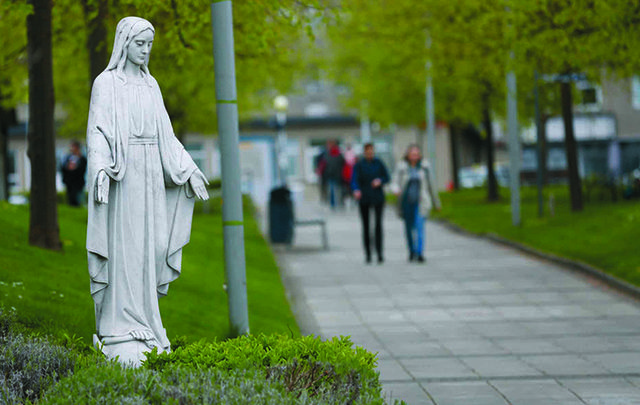Barring Christian taxpayers’ taxes from being spent on Christian institutions attacks civil society, writes David Quinn
Will Catholic hospitals soon be prevented from putting religious symbols such as crosses on public display? That appeared to be the suggestion of a report commissioned by the Government.
The Government asked Catherine Day, former secretary general of the European Commission, to look into the future relationship of the State with ‘voluntary hospitals’. This is basically a catch-all term for hospitals established by voluntary organisations like religious orders.
In Ireland, publicly-funded Catholic hospitals look after about a quarter of patients in public hospitals at any one time.
One of the suggestions of the report is that the matter of decor be looked at. The review says that Catholic hospitals should be “cognisant of the impact of decor” on patients and “strive to ensure” their personal preferences are met to the “greatest extent possible”.
What does this mean? Does it mean, for instance, that if one patient on a ward objects to a cross in a ward it will be taken down so as not to cause offense?
But what about the wishes of all the other patients? If you are in a Catholic hospital you can reasonably expect to see Catholic religious symbols on display. Many patients will want to see those symbols and will derive comfort from them.
Symbols
Hospitals patients almost by definition are older than average, many will be at the end of their lives, and they will be disproportionately Massgoers. Are they to be deprived of their wish to be cared for in an obviously Catholic hospital, or must they be told that any religious symbols are to be kept personal and private?
What about the overall ethos of the hospital? The report leaves open-ended whether these hospitals must provide every procedure and service that is legally available in the State.
It suggests that the State could enter into agreements with Catholic hospitals whereby they agree to provide particular services in return for funding for those services. A hospital could decide not to perform abortions, for instance, and therefore would obviously not be given public money for this purpose.
Such an arrangement would respect the ethos and autonomy of these hospitals. Needless to say, Health Minister Simon Harris is having none of it. A source at the Department of Health told Times Ireland, “government policy is that all hospitals should provide lawful services”.
This goes far deeper than the issue of religious symbols on walls. If a Catholic hospital performs abortions it is no longer a Catholic hospital no matter what it says on the door and no matter what religious symbols are on display.
The distinct possibility is that within the next few years Ireland will also have assisted suicide and euthanasia. Must Catholic hospitals provide these ‘services’ too?
We live in the era of a very overbearing State. It no longer properly respects the autonomy and independence of civil society, of which the Church is only one part.
The State has a near-monopoly of legal power. It can pass any law it wants and force people and organisations to do anything that is not unconstitutional. It should be forbearing about its powers. No-one and nothing should be forced to do something that is against their beliefs.
For example, if a woman can obtain an abortion at the next hospital, there is no good reason to force Catholic hospitals to perform them also.
The State takes a huge amount of money from us, almost €80 billion per annum. This also squeezes civil society because it harms its ability to engage in the sort of very serious annual fund-raising necessary to fund a hospital, for instance.
A hospital like the Mater Public in Dublin costs about €300 million per annum to run (with about €250 million of this coming from public funds). When the State takes so much money out of our pockets, it would be incredibly difficult for it to stay open without public funding, or without going fully private and becoming available only to people who can afford private health insurance.
A State that takes so much money should be generous enough to fund the kinds of things that people want and allow them to run independently, within broad limits.
Therefore, if enough people want the State to continue funding Catholic hospitals, then it should do so, just as it should go on funding Catholic and other faith-schools, if people want them.
This is why almost every democratic State funds faith schools. France pays for teachers’ salaries in Catholic schools, for instance, while Britain almost fully funds faith schools there. They do so in response to public demand.
The State has zero right to deny the public their wish in these matters and to insist that anything which receives a penny in public funds be effectively brought under State control as well.
Because the State has become so vast, civil society organisations, especially in the voluntary sector, have become very dependent on it for funding. That includes many Church organisations which provide all sorts of public services.
In return for taking so much money from us, the State has to be generous in how it uses that money. It has to fund the things we want, and that includes organisations run by the Church, such as schools and hospitals. If it does not respect the autonomy of civil society and allow it to flourish, then it is effectively annexing civil society.
That is not the act of a properly democratic State.


 David Quinn
David Quinn